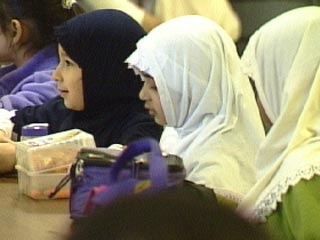
Muslim Women Say They're Equal in Islam
By Barbara Rodgers
Source: KPIX Channel 5 News, San Francisco
February 12, 2002
 Muslim girls having lunch at school. |
People Make Assumptions
The September 11th attacks have prompted many Americans to take a new look at Islam -- one of the fastest-growing religions in the U.S.
Muslim women, who wear a veil or a headscarf, are becoming a much more common sight, especially in the Bay Area.
If it were not for the hijab, or headscarf, people would probably make no assumptions about Ameena Jandali. But because of the way she dresses, they do.
"Just last week I was dropping someone off at the airport," she said. "I was waiting in the back seat because my baby was crying. You know the airports now -- you're not supposed to stay too long. So the security guard came and said, 'You really need to move,' and said, 'Can you drive?' I said, 'Yeah, I'm 40 years old and I can drive.'"
Jandali was born to Muslim parents in Colorado. She has a college degree, has been married for 23 years, and is the mother of five children. She was in high school when she decided to become a practicing Muslim.
"I made that conscious choice," she said. "I saw the benefits of practicing Islam. I saw the truth of Islam."
Christy Chase, an IT manager at the NASA-Ames Research Center in Mountain View, was not born a Muslim. She converted 19 years ago.
"As a Christian, I was always waiting to be saved," she said. "I heard these wonderful stories about the sunlight coming through the window. I kind of waited for my moment to have that great moment of being saved, and knowing I found the truth, and it wasn't anything that exciting."
Chase married an immigrant from Egypt with whom she has seven children -- six of them girls -- all being raised as Muslims.
Focusing on School
At the age of puberty, Muslim girls are required to begin covering their heads in public. It's a concept that for many non-Muslim women appears to fly in the face of women's equality. But Muslim women disagree. Jandali says the hijab is "for the purpose of raising a woman above her sexuality -- so that she is not viewed or judged or related to based on the way she looks -- and to get away from some of the tendencies in society to misuse women's bodies, to abuse women's bodies."
Muslims are not allowed to drink, smoke, or date casually. How does that sit with Chase's 16-year-old daughter?
"You know, I really don't miss out on dating. I don't date," she said. "I get a lot of 'Don't you really want to date?' No, from watching you, your boyfriend, not really. Men take too much time. I'm focusing on school."
Most teenage boys and girls do plan to marry someday, but the Muslim way of choosing a mate is generally motivated more by personal histories than hormones.
"They're starting the relationship with the basis of marriage in mind," Chase said. "Rather than, 'Let's date and have a good time and see where this goes,' the idea is you see if your goals are aligned, and then you find out if you're compatible, and attracted to each other, rather than the opposite."
And if you think a modestly-dressed Muslim woman wouldn't be interested in a red party dress, then you'd be wrong.
"Ideally, Islamicly, you're home, you're dressed nice. You do your hair, even makeup," Chase said.
Culture has a Strong Hold
Clearly, many American Muslim women feel they have plenty of freedom and independence, but are well aware that's not the case for Muslim women everywhere.
"In many of the Muslim countries around the world, the culture has a strong hold on the people," Jandali said. "Islam should not be forced down people's throat. Something as minor as showing a little bit of flesh should not be a reason for some of the reported abuses."
Muslim men are able to marry up to four wives. But the Qur'an says that the man must treat each wife fairly, and that means financially and emotionally. Because it is illegal in the U.S. to have more than one wife, many American Muslim scholars say a Muslim man here cannot marry more than one woman, because the other women would not be treated fairly under American law.
Overall, Muslim women say theirs is a religion that respects women and elevates them to a special place. In Islam, they say, they are equal to men, but different from them.
